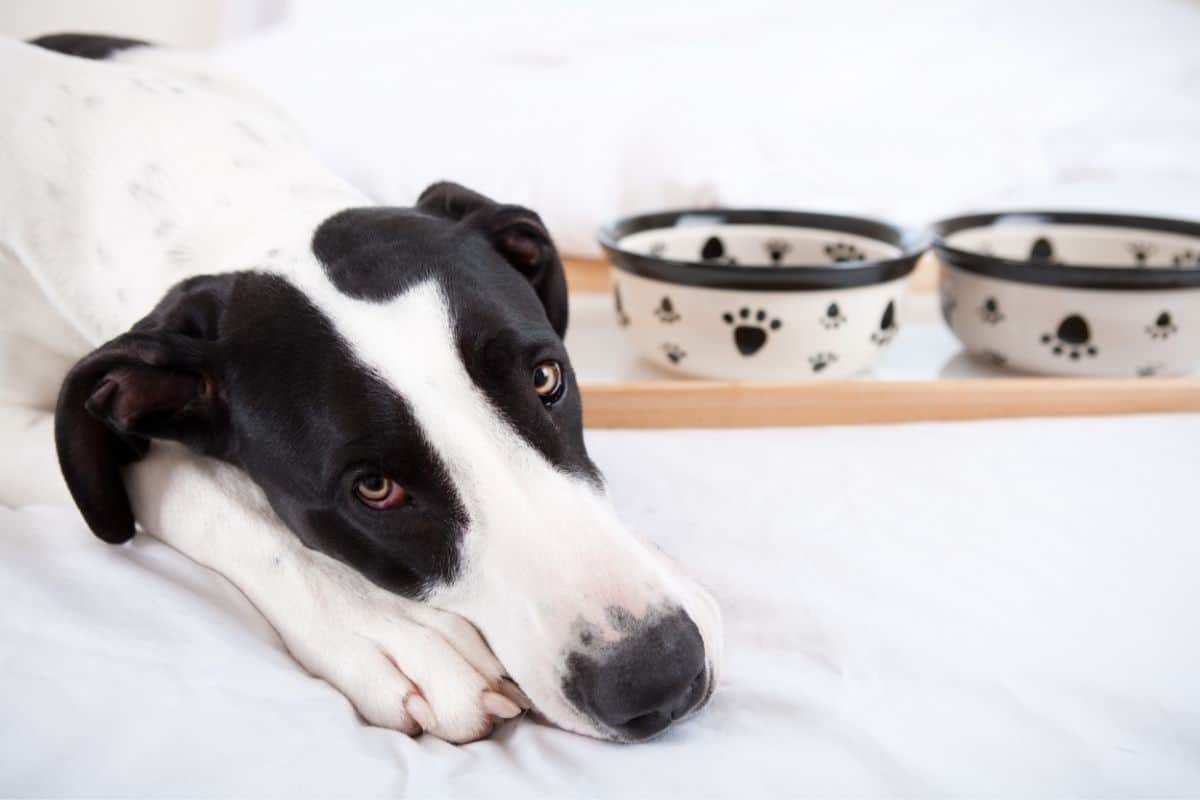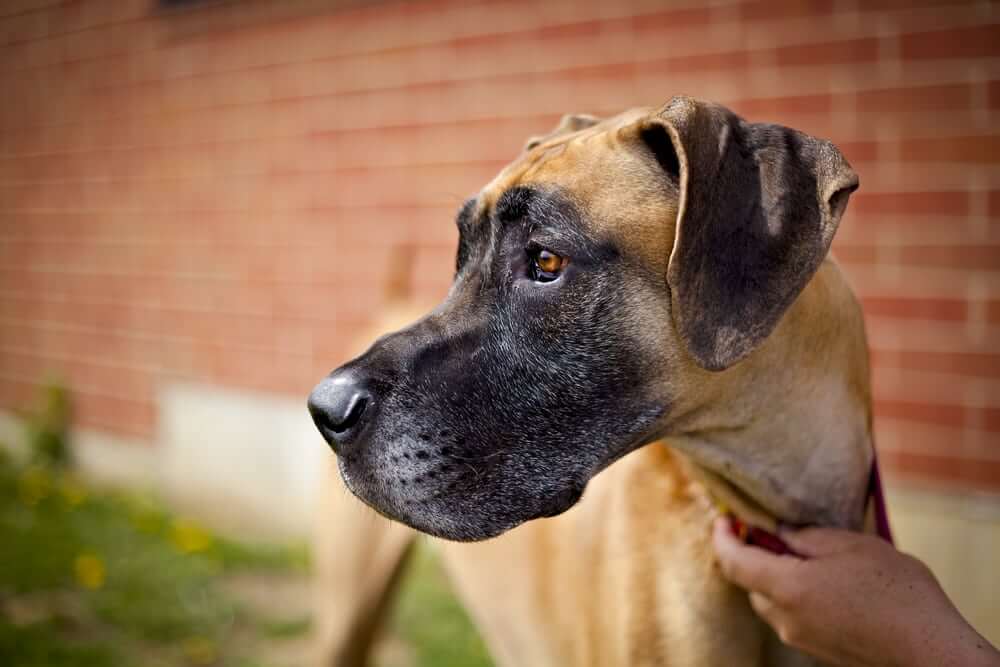Great Danes are a popular breed of dog known for their loyalty, affection, and gentle nature. However, many potential owners wonder if these gentle giants can be left alone without suffering from anxiety or destructive behavior. The answer is not a simple yes or no, as it depends on various factors such as the dog's age, personality, and training.
While Great Danes are generally sociable dogs that enjoy human company, they can be trained to be comfortable and calm when left alone for short periods. However, leaving a Great Dane alone for extended periods can lead to separation anxiety, destructive behavior, and even health issues. It is important for owners to understand their dog's needs and take the necessary steps to ensure their well-being when they need to be away.

Understanding Great Danes
Great Danes are a breed of dog that is known for their towering presence and gentle demeanor. They are often referred to as gentle giants due to their size and friendly personality. Great Danes are an intelligent and sociable breed that is easygoing and mild-mannered, making them great family pets.
Their temperament is stable, and they are known to be affectionate towards their human companions. Great Danes are known to form deep bonds with their owners, and they thrive on attention and affection.
Despite their size, Great Danes are known for their friendly and sociable nature. They are not aggressive and are generally good with children and other pets. However, it is important to socialize them at a young age to ensure that they are well-behaved and comfortable around others.
Great Danes are also known for their intelligence and trainability. They are quick learners and respond well to positive reinforcement training methods. It is important to provide them with regular exercise and mental stimulation to keep them happy and healthy.
Overall, Great Danes are a friendly and affectionate breed that makes great family pets. Their gentle nature and sociable personality make them a popular choice for families with children and other pets.
Great Danes and Loneliness
Great Danes are social animals and thrive on companionship. They enjoy spending time with their family and interacting with them. Leaving them alone for extended periods can cause stress and anxiety in some dogs, leading to destructive behavior, excessive barking, and other undesirable traits.

While some Great Danes may tolerate being left alone for short periods, it is not recommended to leave them alone for more than a few hours. Dogs that are left alone for long periods may develop separation anxiety, a condition that can cause them to become anxious and stressed when their owners are away.
To prevent separation anxiety, it is important to socialize your Great Dane from an early age. Socialization can help your dog become comfortable around other people and animals, reducing their anxiety when left alone. Additionally, providing your Great Dane with plenty of exercise and mental stimulation can help them relax and rest during your absence.
If you must leave your Great Dane alone, there are several things you can do to make their experience more comfortable. These include providing them with a comfortable and safe space, leaving them with plenty of toys and treats, and gradually increasing the time they spend alone.
Overall, while Great Danes can be left alone for short periods, it is important to ensure they are adequately socialized and prepared for your absence. With proper training and preparation, your Great Dane can learn to be comfortable and calm while you are away.
Training and Exercise Requirements
Great Danes are a large and energetic breed that require regular exercise to stay healthy and happy. A lack of exercise can lead to obesity, which can cause a range of health problems, including joint pain, heart disease, and diabetes. Therefore, it is essential to provide your Great Dane with enough exercise to burn off their energy and maintain a healthy weight.
A daily routine of moderate exercise is recommended for Great Danes. This could include a walk or jog for 30-60 minutes per day, depending on the dog's age, health, and energy level. It is important to note that Great Danes should not be over-exercised below the age of 2 years, as it can harm their developing bones and cause skeletal health problems.
In addition to regular exercise, it is also important to establish a consistent training routine for your Great Dane. Positive reinforcement is the most effective method of training for Great Danes, as they respond well to praise and rewards. Consistency is key when training a Great Dane, as they can be stubborn at times.
Providing your Great Dane with mental stimulation is just as important as physical exercise. Interactive toys, puzzle games, and playtime with other dogs can help to keep your Great Dane's mind active and engaged.
Overall, Great Danes require a lot of attention and care to keep them healthy and happy. Regular exercise, training, and mental stimulation are essential to their well-being. With the right care and attention, Great Danes can be wonderful companions and loyal family pets.
Behavioral Issues and Solutions
Great Danes are known for their loyalty and affection towards their families. However, leaving them alone for extended periods can result in behavioral issues that may be challenging to address. Some common behavioral issues include destructive behavior, incessant barking or whining, and inappropriate elimination indoors.
Destructive behavior is often a result of boredom. Great Danes are intelligent dogs that require mental stimulation and physical exercise to remain healthy and happy. Providing them with toys, particularly puzzle toys, can help keep them entertained and prevent destructive behavior.
Separation anxiety is another issue that can result in destructive behavior. Crate training can be an effective solution to address separation anxiety. Begin with short periods of alone time, say 10 to 15 minutes, and gradually increase the duration as your Great Dane becomes more comfortable. Make sure each experience is positive, so your dog associates being alone with good feelings.
Incessant barking or whining can be a sign of anxiety or boredom. Providing your Great Dane with adequate exercise and mental stimulation can help reduce this behavior. Additionally, teaching them the "quiet" command can help them learn to control their barking.
Inappropriate elimination indoors can be a sign of a lack of proper training or a medical issue. It is essential to ensure that your Great Dane is adequately trained to eliminate outdoors. If the behavior persists, it is recommended to consult with a veterinarian to rule out any underlying medical issues.
Aggression and dominant behavior can be a result of inadequate socialization and training. It is crucial to socialize your Great Dane from a young age to prevent these behaviors from developing. Additionally, providing them with obedience training can help establish boundaries and prevent dominant behavior.
Overall, addressing behavioral issues in Great Danes requires patience, consistency, and adequate training. Providing them with adequate exercise, mental stimulation, and socialization can help prevent many of these issues from developing.
Health Considerations
Great Danes are generally healthy dogs, but like all breeds, they are prone to certain health issues. It is important for owners to be aware of these potential health problems and take preventative measures to ensure their Great Dane remains healthy.

One of the most common health concerns for Great Danes is hip dysplasia, a genetic condition that affects the hip joint and can cause pain and mobility issues. Regular vet check-ups and monitoring your Great Dane's weight can help prevent or manage this condition.
Another serious health issue that can affect Great Danes is bloat, a condition where the stomach fills with gas and twists on itself. This can be life-threatening and requires immediate veterinary attention. Owners should be aware of the signs of bloat and take preventative measures such as feeding smaller, more frequent meals and avoiding exercise immediately before or after meals.
Great Danes are also at risk for heart disease and certain types of cancer. Regular vet check-ups and monitoring your Great Dane's behavior and eating habits can help catch these conditions early and increase the chances of successful treatment.
In addition to these health concerns, Great Danes require regular grooming to maintain their coat and prevent skin issues. Regular brushing and bathing can help prevent matting and skin irritation.
Overall, owning a Great Dane requires a commitment to their health and well-being, including regular vet check-ups and preventative measures. While vet bills may be higher for larger breeds, investing in your Great Dane's health can lead to a happier, healthier life for both you and your furry friend.
Comfort and Environment
Great Danes are known for their loyalty and protective nature towards their families. They are also sensitive dogs who require a comfortable environment to thrive. When it comes to leaving a Great Dane alone, it is important to ensure that their space is comfortable and safe.
One option for creating a comfortable environment for a Great Dane is to provide them with a crate. However, it is important to note that not all Great Danes take well to being crated. If a Great Dane is comfortable in a crate, it can provide them with a safe space to retreat to when they are feeling anxious or overwhelmed.
In addition to providing a comfortable space, it is important to ensure that the environment is safe for a Great Dane. Great Danes are known for their drool and slobbering, which can create a slippery and potentially hazardous environment. It is important to keep floors and surfaces clean and dry to prevent accidents.
Overall, creating a comfortable and safe environment for a Great Dane is essential for their well-being. When leaving a Great Dane alone, it is important to ensure that they have access to a comfortable space and that the environment is safe and hazard-free.
Alternatives and Additional Care
Leaving a Great Dane alone for long periods of time is not recommended. However, there are alternatives and additional care options that can help ensure the well-being of your gentle giant.
One option is to hire a dog walker or pet sitter to come and spend time with your Great Dane while you are away. This can provide much-needed social interaction and exercise for your dog. Another option is to take your Great Dane to a doggy daycare where they can interact with other dogs and receive attention from trained professionals.
If you need to leave your Great Dane alone, it is important to prepare them for the experience. This can include creating a designated space for them to stay in, providing plenty of toys and treats to keep them occupied, and gradually increasing the amount of time they are left alone to help prevent isolation distress.
For those who are moving or experiencing a change in routine, it is important to provide extra attention and care to your Great Dane to help ease any anxiety they may be feeling. This can include spending extra time with them, providing comfort items such as blankets or toys, and gradually introducing them to their new surroundings.
While pet cameras can be a useful tool for keeping an eye on your Great Dane while you are away, they should not be relied upon as the sole means of care. It is important to provide your Great Dane with human interaction and attention to prevent loneliness and anxiety.
Overall, while there are alternatives and additional care options available, it is important to remember that leaving a Great Dane alone for long periods of time can be detrimental to their well-being. It may be expensive to hire a dog walker or pet sitter, but the peace of mind and health of your Great Dane is worth the investment.

Feeding and Treats
Great Danes are known for their large size and appetite. It is important to provide them with a balanced and nutritious diet to maintain their health and well-being.
When it comes to treats, it is important to choose ones that are appropriate for their size and dietary needs. Peanut butter can be a great treat for Great Danes, but it should be given in moderation as it is high in fat. It is also important to choose a peanut butter that does not contain xylitol, which can be toxic to dogs.
Freezing treats can be a fun and interactive way to provide mental stimulation for Great Danes. Some examples of treats that can be frozen include carrots, apples, and peanut butter.
It is recommended to feed Great Danes multiple small meals throughout the day rather than one large meal to help prevent bloat, a potentially life-threatening condition. It is also important to provide access to fresh water at all times.
Overall, feeding and treating Great Danes requires careful consideration of their size and dietary needs. Providing a balanced diet and appropriate treats can help maintain their health and happiness.
Conclusion
Great Danes are loyal and affectionate dogs that can make great companions. However, they require proper care and attention to thrive. While they can be left alone for short periods of time, it's important to consider their physical and behavioral needs before leaving them for extended periods.
To ensure that your Great Dane is comfortable and calm while you are away, it's essential to start training them from a young age. Gradually increase the time that they are left alone, and provide them with plenty of exercise and mental stimulation. This will help prevent anxiety and potentially destructive behavior.
It's also important to note that Great Danes can suffer from separation anxiety, so it's crucial to provide them with companionship and interaction when you are home. Regular exercise and playtime can help keep them happy and healthy.
In conclusion, Great Danes can be left alone for short periods of time with proper training and preparation. However, it's important to consider their needs and provide them with adequate care and attention to ensure their well-being.




